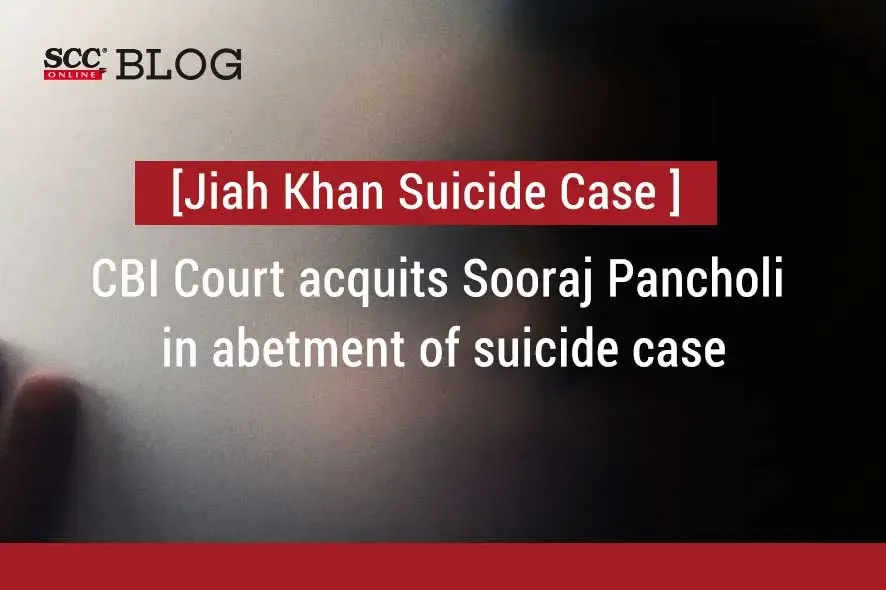CBI Court Mumbai: The Single-Judge Bench of A.S. Sayyad, J., acquitted Sooraj Pancholi of the offences punishable under Section 306 of the Penal Code, 1860 (‘IPC’) and Section 235(1) of the Code of Criminal Procedure, 1973 (‘CrPC’) for abetting the suicide of late actress Jiah Khan.
Background
Sooraj Pancholi (‘accused’), son of actor Aditya Pancholi and Zarina Wahab, who rose to fame with his debut film ‘Hero’, was arrested in 2013, for abetting the suicide of late actor ‘Jiah Khan’ (‘deceased’). He was later released on bail by Bombay High Court. Thereafter, based on a petition filed by the late actor’s mother, Rabia Khan (‘complainant’), the High Court transferred the case to CBI for detailed investigation of the matter. CBI formed charges against Pancholi under Section 306 of IPC.
Court’s Decision
Whether the accused abetted the deceased to commit suicide?
The Court said that for the purpose of finding out if a person has abetted commission of suicide, the consideration would be if the accused is guilty of the act of instigating the suicide. Placing its reliance on various judgments of the Supreme Court, the Court noted that instigation means to goad, urge forward, provoke, incite or encourage to do an act. The Court also said that if the person who committed suicide has been hypersensitive and the action of the accused is otherwise not ordinarily expected to induce a similarly circumstanced person to commit suicide, it may not be safe to hold the accused guilty of abetment of suicide.
The Court noted that though the complainant tried to show that the deceased was happy and was not in depression, the evidence of the other witnesses reflects some other scenario. The Court said that the evidence of the witness, a doctor, is important to be relied upon, to understand the mental health of the deceased. It was revealed that the deceased was emotionally suffering due to her stress from work and not able to get projects. The Court also noted that the deceased was very emotional and sensitive regarding relationships.
The Court also noted that after long and deep investigation, the investigation officers concluded that it was suicide case. Though the complainant stated that it was a murder case, the available evidence on record does not reflect it to be a murder case. The Court said that 80 percent evidence given by the complainant were found to be suffering from improvements and contradictions and the complainant herself by giving such contradictory statements demolished the case of the prosecution, for which she is solely responsible.
The Court said that it cannot be ignored that the deceased had suicidal tendency and had tried to commit suicide on an earlier occasion, and it was the accused who had called upon a doctor. The accused had tried to help the deceased and get her out of depression. Further, the Court said that it cannot be concluded that the accused had forced the deceased to undergo a medical termination of pregnancy.
Therefore, there is no evidence indicating that the accused at any point of time had abetted the deceased to commit suicide. The Court said that it is an unfortunate incident that a young girl has committed suicide, however, the available evidence on record reflects that the deceased was victim of her own sentiments. She could not overcome her sentiments and her love for the accused for which the accused cannot be held responsible.
The Court held that if the evidence produced by the prosecution are tested on the touchstone of the requirements for establishing the offence under Section 306 of IPC, the prosecution had utterly failed to produce sufficient and dependable evidence to establish the ingredients. The evidence recorded against the accused were vague, general and omnibus and does not reflect any overt act or role attributed by the accused.
Thus, the Court acquitted the accused of the charges under Sections 306 of the Penal Code.
[Central Bureau of Investigation v. Sooraj Pancholi, Session case no. 83 of 2014, decided on 28-04-2023]







